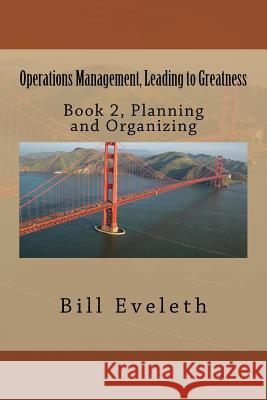Operations Management, Leading to Greatness: Book 2, Planning and Organizing » książka
Operations Management, Leading to Greatness: Book 2, Planning and Organizing
ISBN-13: 9781517508203 / Angielski / Miękka / 2015 / 192 str.
8 critical operations management functions are discussed and reviewed in Operations Management, Leading to Greatness, Book 2, Planning and Organizing, as follows: Chapter 1 Project Management Learning Objective: Project Management is the planning, organizing, directing and controlling of the activities and resources utilized in achieving a goal. Chapter 2 Inventory Control and Management Learning Objective: Inventory is a current asset on the balance sheet, meaning it is something the business owns and intends to convert to cash within one year. Inventory Management includes all of the tasks associated with organizing, controlling and directing the inventory in an organization. Inventory management functions include forecasting, controlling and minimization to optimal levels of all the types of inventory within an organization. Chapter 3 Forecasting Learning Objectives: A forecast is a projection of a future event. In operations management, that future event generally is demand. Chapter 4 The Theory of Constraints, Bottlenecks and Operations Research Learning objective: Constraints are the points in a system where the system meets throughput capacity limitations. It's the part of the system most likely to fail. Bottlenecks are points in a system where production capacity is at the lowest level of the entire system. Operations Research is a scientific approach to resource allocation and critical to more complex decision-making. Chapter 5 Sustainability Learning objective: Sustainability is the conservation of resources to ensure that future generations have resources required to meet their needs. Sustainability also means building efficiencies and effectiveness to ensure longevity and minimize waste. Chapter 6 New Product Design and Development Learning objective: New product design and development is an exciting area of operations management. It is the process of fashioning new or improved products or services and developing a system to efficiently deliver them to the end user. Chapter 7 Managing Human Resources Learning Objectives: Management is the planning, organizing, directing and controlling of all the resources required to meet an end objective. Managing people involves the hiring, directing, motivating, disciplining, and rewarding of the people in an organization who are directly or indirectly responsible for achieving an end objective. Appendix 1 Culture Learning objective: The reader will be able to discuss why an organization's culture is critical to the organization's success as well as how to develop a culture of achievement and understand why it's so important in operations management. Appendix 1 discusses what a culture statement is, why culture is important and how to create an effective and impactful culture in an organization.
Zawartość książki może nie spełniać oczekiwań – reklamacje nie obejmują treści, która mogła nie być redakcyjnie ani merytorycznie opracowana.











